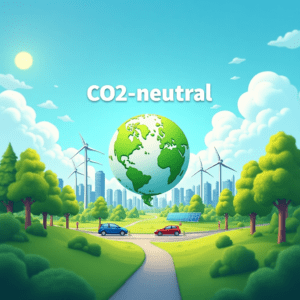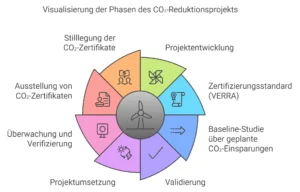The changes in the climate have profound effects on the weather, which we can feel in our daily lives. Extreme weather events like heatwaves, storms, and floods are increasing and becoming more intense. These phenomena are no longer just sporadic events but seem to be developing into a new normal.
When we walk through the streets, we notice that the seasons are no longer as clearly defined as they once were. Winter can be milder and shorter, while summer becomes unbearably hot. These changes affect not only our well-being but also agriculture and the availability of water resources.
Moreover, global warming is causing a shift in weather patterns in many regions of the world. In some areas, we experience an increase in rainfall, while others suffer from droughts. These imbalances can have catastrophic consequences for the environment and society.
When we look at weather forecasts, we notice that they are becoming increasingly unpredictable. The prediction of weather events is becoming more difficult, posing great challenges in planning activities and preparing for potential natural disasters. It is evident that the weather is no longer what we once knew.
Key Takeaways
- The weather is becoming more extreme and unpredictable, leading to more frequent storms, droughts, and floods.
- Many animal and plant species are suffering due to climate change and are forced to adapt to new living conditions or face extinction.
- Sea levels are rising, leading to flooding of coastal areas and salinization of freshwater resources.
- Health issues such as heatwaves, air pollution, and the spread of diseases are on the rise.
- The economic consequences of climate change are immense, as crop yields decrease, insurance costs rise, and infrastructure is damaged.
- Adaptation measures include expanding flood protection, promoting climate-resistant plants, and developing heat action plans.
- Natural disasters are exacerbated by climate change, leading to an increased risk to people and infrastructure.
- Each individual can contribute to climate protection through energy savings, sustainable mobility, and conscious consumption.
Changes in the Animal and Plant World
The changes in climate also have significant impacts on the animal and plant world. Many species are forced to adapt to new living conditions or leave their habitats. When we walk through forests or parks, we may notice that some plant species bloom earlier or extend their blooming period.
This not only affects the plants themselves but also the animals that depend on them. Insects, birds, and other animals must also adapt in order to survive in a rapidly changing environment. Another concerning phenomenon is species extinction.
When we look at reports on endangered species, it becomes clear that many of them are at risk due to climate change. The destruction of habitats through rising temperatures and extreme weather conditions means that many animals can no longer find suitable living environments. This not only impacts biodiversity but also the ecosystems on which we all rely.
If we do not act, we risk losing biodiversity and disrupting natural balances.
Rising Sea Levels
Rising sea levels are one of the most serious consequences of climate change that affects us all. If we live in or visit coastal areas, we can already observe the impacts. Coastal cities are increasingly facing flooding and erosion.
The rising water levels threaten not only infrastructure but also the livelihoods of many people living in these areas. If we imagine that entire cities could potentially become uninhabitable, the magnitude of the problem becomes clear. In addition to the direct effects on coastal regions, rising sea levels also have far-reaching consequences for the global climate.
The acidification of the oceans and the melting of the poles are closely linked and amplify each other. When we address these issues, we realize that the rise in sea levels is not just a local problem but a global challenge that requires international cooperation. It is crucial that we face this reality and take action to prevent the worst consequences.
Health Impacts
The health impacts of climate change are another concerning issue that is often overlooked. When we talk about climate change, we often think of environmental or economic problems, but the effects on our health are equally severe. Extreme temperatures can lead to heat strokes and other heat-related illnesses.
Vulnerable groups, such as the elderly and children, are particularly at risk, as they are more sensitive to temperature changes. When we are exposed to heat, we often feel exhaustion and discomfort that accompany high temperatures. Furthermore, climate change also facilitates the spread of diseases.
With rising temperatures and changing rainfall patterns, diseases like malaria and dengue fever are spreading to new regions. If we stay or travel in these areas, we are at higher risk. Allergies are also increasing as pollen seasons lengthen and allergens spread.
It is important that we are aware of these health risks and take measures to protect ourselves and our communities.
Economic Consequences
The economic consequences of climate change are immense and affect all areas of our lives. When we think about businesses, we can already see how extreme weather events can lead to production losses. Agricultural operations suffer from droughts or floods, leading to crop failures and rising food prices.
When we shop in supermarkets, we often notice price increases for certain products – a direct result of climatic changes. Furthermore, governments and businesses increasingly need to invest in infrastructure to adapt to climate change. Coastal protection measures are necessary to protect cities from rising sea levels.
These investments require substantial financial resources and can affect other important areas such as education or healthcare. When we think about climate change, we should also keep in mind the long-term economic consequences and ask ourselves how we can create a sustainable future.
Adaptation Measures
In order to face the challenges of climate change, we need to take proactive adaptation measures. This means not only that governments need to pass laws, but also that each individual can take responsibility. When we think about adaptation strategies, we should focus on sustainable practices – whether in energy generation or daily life.
Switching to renewable energy is an important step in the right direction. Moreover, we should also design our cities to be more resilient to extreme weather events. Green infrastructure such as parks and green roofs can help reduce urban heat islands and manage rainwater more effectively.
If we actively participate in these changes and raise our voices, we can have a positive impact on our communities and contribute to combating climate change.
The Role of Natural Disasters
Natural disasters play a crucial role in the context of climate change and often highlight the urgency of action. In recent years, we have witnessed an increase in extreme weather events – from devastating hurricanes to catastrophic wildfires. These disasters not only have immediate effects on the lives of people in the affected areas but also long-term consequences for the environment and the economy.
When we observe these events, it becomes clear that climate change is not just an abstract threat; it already has real consequences. The response to natural disasters requires coordinated efforts from governments, organizations, and individuals. We must ensure that our emergency plans are robust and that resources can be mobilized quickly.
At the same time, we should learn from past disasters and develop strategies to minimize future risks. By addressing the causes of natural disasters and taking preventive measures, we can help mitigate the impacts of climate change.
Actionable Steps for Individuals
Each individual has the opportunity to make a difference in the fight against climate change. It starts with small changes in daily life – whether by choosing the bicycle over the car or purchasing local products. When we consume more consciously and reduce our ecological footprint, we are actively contributing to the fight against climate change.
Engaging in local initiatives or environmental groups can also have a significant impact. Additionally, we should raise our voices and urge political decision-makers to take action against climate change. By participating in elections and expressing our opinions, we can ensure that climate protection remains on the political agenda.
It is up to all of us – as individuals and as a community – to take responsibility and actively work towards a sustainable future.
If you are interested in the consequences of climate change and want to understand how you can personally contribute to reducing your CO2 emissions, I recommend reading the article „Your CO2 Balance“. In this article, you will find valuable information on how to calculate and understand your own CO2 emissions. This is an important step to handle the resources of our planet more consciously and actively combat climate change.



